Entrepreneurship: Types, Impact on Economy, and Characteristics of Successful Entrepreneurs
VerifiedAdded on 2022/12/28
|13
|4129
|2
AI Summary
This document provides an overview of entrepreneurship, including the different types of entrepreneurial ventures and their typology. It also discusses the impact of small and micro enterprises on the economy and the importance of small businesses and start-ups to the growth of the social economy. Additionally, it explores the characteristics and skills that differentiate successful entrepreneurs from other business managers.
Contribute Materials
Your contribution can guide someone’s learning journey. Share your
documents today.

Entrepreneurship and
Small Business
Management
Small Business
Management
Secure Best Marks with AI Grader
Need help grading? Try our AI Grader for instant feedback on your assignments.
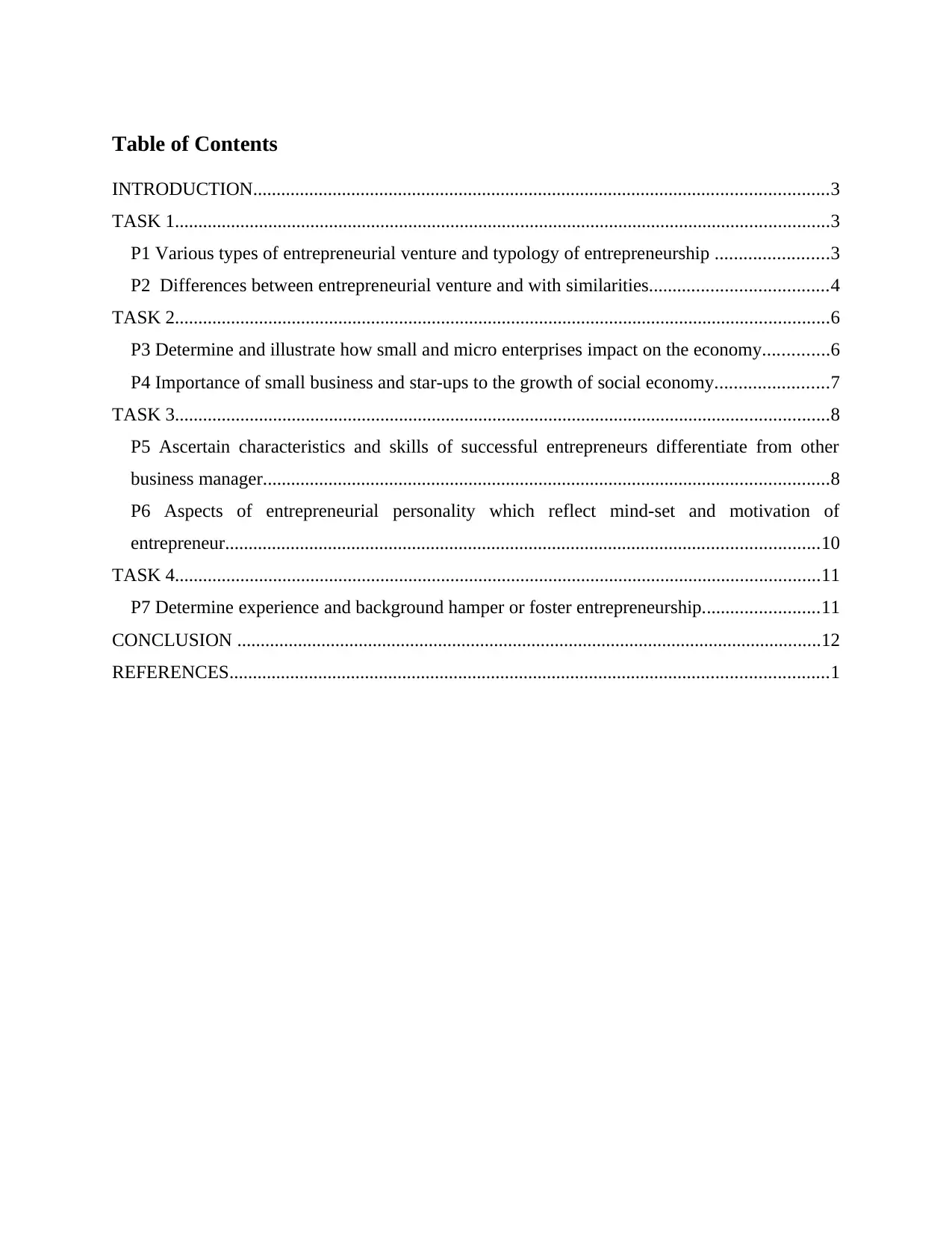
Table of Contents
INTRODUCTION...........................................................................................................................3
TASK 1............................................................................................................................................3
P1 Various types of entrepreneurial venture and typology of entrepreneurship ........................3
P2 Differences between entrepreneurial venture and with similarities......................................4
TASK 2............................................................................................................................................6
P3 Determine and illustrate how small and micro enterprises impact on the economy..............6
P4 Importance of small business and star-ups to the growth of social economy........................7
TASK 3............................................................................................................................................8
P5 Ascertain characteristics and skills of successful entrepreneurs differentiate from other
business manager.........................................................................................................................8
P6 Aspects of entrepreneurial personality which reflect mind-set and motivation of
entrepreneur...............................................................................................................................10
TASK 4..........................................................................................................................................11
P7 Determine experience and background hamper or foster entrepreneurship.........................11
CONCLUSION .............................................................................................................................12
REFERENCES................................................................................................................................1
INTRODUCTION...........................................................................................................................3
TASK 1............................................................................................................................................3
P1 Various types of entrepreneurial venture and typology of entrepreneurship ........................3
P2 Differences between entrepreneurial venture and with similarities......................................4
TASK 2............................................................................................................................................6
P3 Determine and illustrate how small and micro enterprises impact on the economy..............6
P4 Importance of small business and star-ups to the growth of social economy........................7
TASK 3............................................................................................................................................8
P5 Ascertain characteristics and skills of successful entrepreneurs differentiate from other
business manager.........................................................................................................................8
P6 Aspects of entrepreneurial personality which reflect mind-set and motivation of
entrepreneur...............................................................................................................................10
TASK 4..........................................................................................................................................11
P7 Determine experience and background hamper or foster entrepreneurship.........................11
CONCLUSION .............................................................................................................................12
REFERENCES................................................................................................................................1
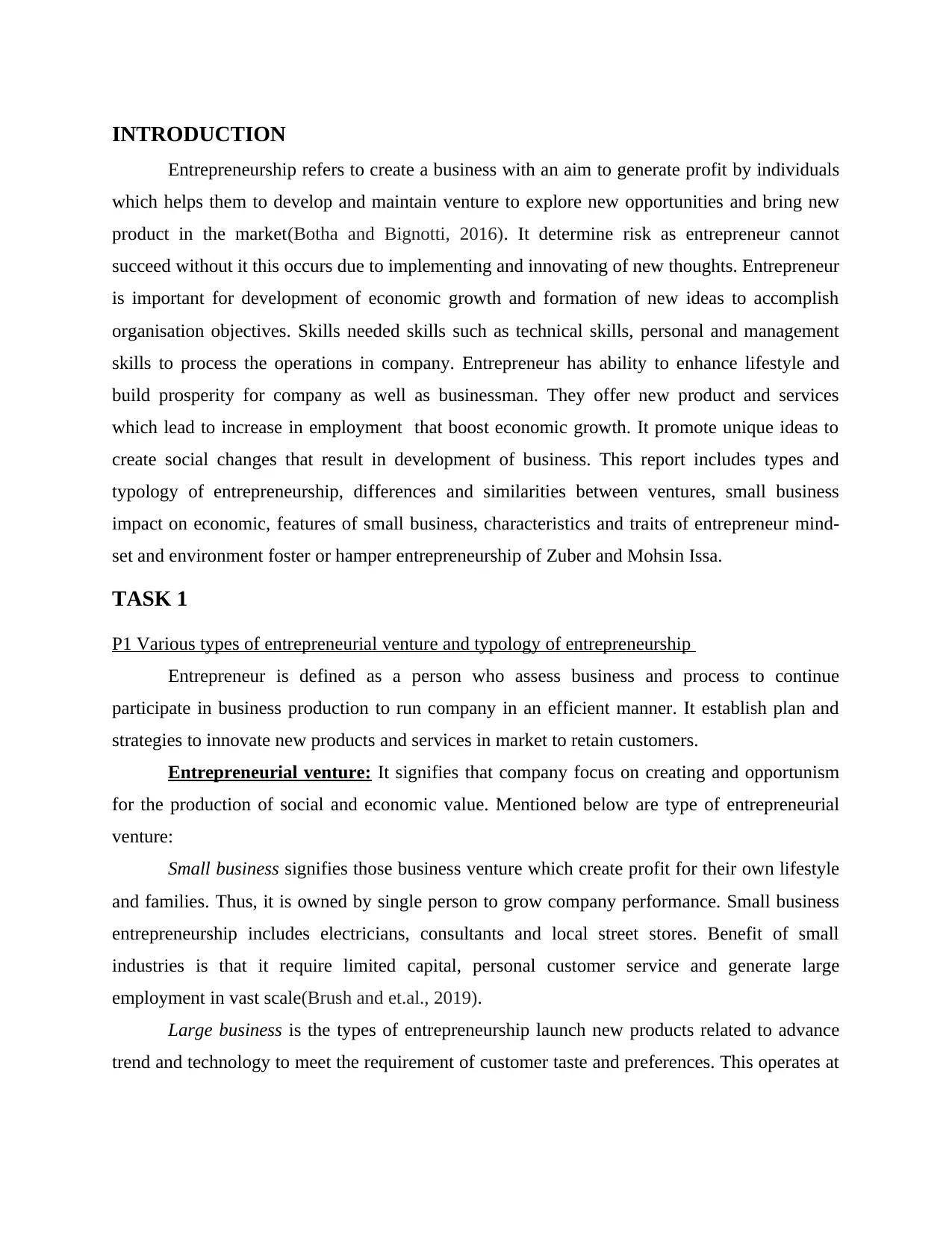
INTRODUCTION
Entrepreneurship refers to create a business with an aim to generate profit by individuals
which helps them to develop and maintain venture to explore new opportunities and bring new
product in the market(Botha and Bignotti, 2016). It determine risk as entrepreneur cannot
succeed without it this occurs due to implementing and innovating of new thoughts. Entrepreneur
is important for development of economic growth and formation of new ideas to accomplish
organisation objectives. Skills needed skills such as technical skills, personal and management
skills to process the operations in company. Entrepreneur has ability to enhance lifestyle and
build prosperity for company as well as businessman. They offer new product and services
which lead to increase in employment that boost economic growth. It promote unique ideas to
create social changes that result in development of business. This report includes types and
typology of entrepreneurship, differences and similarities between ventures, small business
impact on economic, features of small business, characteristics and traits of entrepreneur mind-
set and environment foster or hamper entrepreneurship of Zuber and Mohsin Issa.
TASK 1
P1 Various types of entrepreneurial venture and typology of entrepreneurship
Entrepreneur is defined as a person who assess business and process to continue
participate in business production to run company in an efficient manner. It establish plan and
strategies to innovate new products and services in market to retain customers.
Entrepreneurial venture: It signifies that company focus on creating and opportunism
for the production of social and economic value. Mentioned below are type of entrepreneurial
venture:
Small business signifies those business venture which create profit for their own lifestyle
and families. Thus, it is owned by single person to grow company performance. Small business
entrepreneurship includes electricians, consultants and local street stores. Benefit of small
industries is that it require limited capital, personal customer service and generate large
employment in vast scale(Brush and et.al., 2019).
Large business is the types of entrepreneurship launch new products related to advance
trend and technology to meet the requirement of customer taste and preferences. This operates at
Entrepreneurship refers to create a business with an aim to generate profit by individuals
which helps them to develop and maintain venture to explore new opportunities and bring new
product in the market(Botha and Bignotti, 2016). It determine risk as entrepreneur cannot
succeed without it this occurs due to implementing and innovating of new thoughts. Entrepreneur
is important for development of economic growth and formation of new ideas to accomplish
organisation objectives. Skills needed skills such as technical skills, personal and management
skills to process the operations in company. Entrepreneur has ability to enhance lifestyle and
build prosperity for company as well as businessman. They offer new product and services
which lead to increase in employment that boost economic growth. It promote unique ideas to
create social changes that result in development of business. This report includes types and
typology of entrepreneurship, differences and similarities between ventures, small business
impact on economic, features of small business, characteristics and traits of entrepreneur mind-
set and environment foster or hamper entrepreneurship of Zuber and Mohsin Issa.
TASK 1
P1 Various types of entrepreneurial venture and typology of entrepreneurship
Entrepreneur is defined as a person who assess business and process to continue
participate in business production to run company in an efficient manner. It establish plan and
strategies to innovate new products and services in market to retain customers.
Entrepreneurial venture: It signifies that company focus on creating and opportunism
for the production of social and economic value. Mentioned below are type of entrepreneurial
venture:
Small business signifies those business venture which create profit for their own lifestyle
and families. Thus, it is owned by single person to grow company performance. Small business
entrepreneurship includes electricians, consultants and local street stores. Benefit of small
industries is that it require limited capital, personal customer service and generate large
employment in vast scale(Brush and et.al., 2019).
Large business is the types of entrepreneurship launch new products related to advance
trend and technology to meet the requirement of customer taste and preferences. This operates at
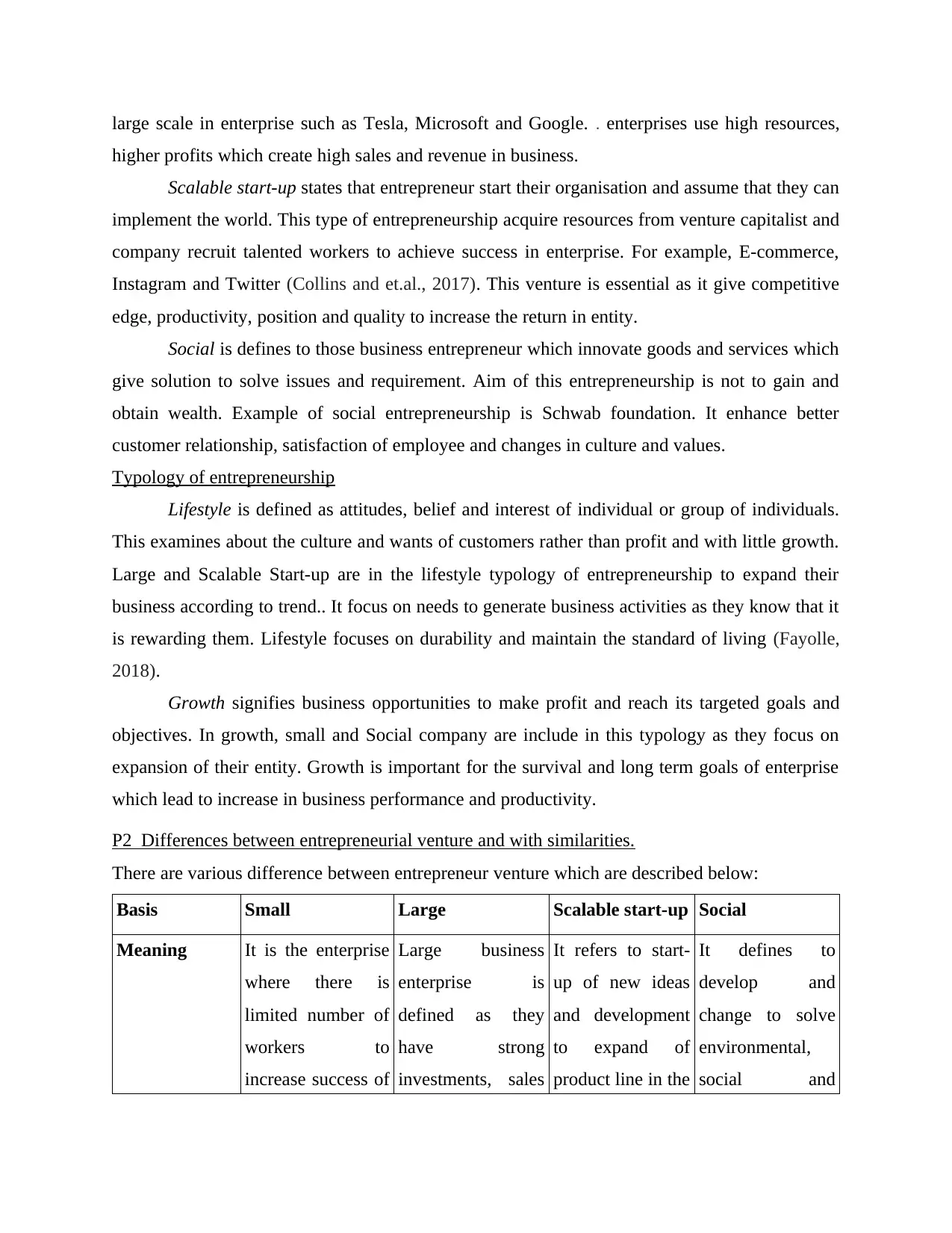
large scale in enterprise such as Tesla, Microsoft and Google. . enterprises use high resources,
higher profits which create high sales and revenue in business.
Scalable start-up states that entrepreneur start their organisation and assume that they can
implement the world. This type of entrepreneurship acquire resources from venture capitalist and
company recruit talented workers to achieve success in enterprise. For example, E-commerce,
Instagram and Twitter (Collins and et.al., 2017). This venture is essential as it give competitive
edge, productivity, position and quality to increase the return in entity.
Social is defines to those business entrepreneur which innovate goods and services which
give solution to solve issues and requirement. Aim of this entrepreneurship is not to gain and
obtain wealth. Example of social entrepreneurship is Schwab foundation. It enhance better
customer relationship, satisfaction of employee and changes in culture and values.
Typology of entrepreneurship
Lifestyle is defined as attitudes, belief and interest of individual or group of individuals.
This examines about the culture and wants of customers rather than profit and with little growth.
Large and Scalable Start-up are in the lifestyle typology of entrepreneurship to expand their
business according to trend.. It focus on needs to generate business activities as they know that it
is rewarding them. Lifestyle focuses on durability and maintain the standard of living (Fayolle,
2018).
Growth signifies business opportunities to make profit and reach its targeted goals and
objectives. In growth, small and Social company are include in this typology as they focus on
expansion of their entity. Growth is important for the survival and long term goals of enterprise
which lead to increase in business performance and productivity.
P2 Differences between entrepreneurial venture and with similarities.
There are various difference between entrepreneur venture which are described below:
Basis Small Large Scalable start-up Social
Meaning It is the enterprise
where there is
limited number of
workers to
increase success of
Large business
enterprise is
defined as they
have strong
investments, sales
It refers to start-
up of new ideas
and development
to expand of
product line in the
It defines to
develop and
change to solve
environmental,
social and
higher profits which create high sales and revenue in business.
Scalable start-up states that entrepreneur start their organisation and assume that they can
implement the world. This type of entrepreneurship acquire resources from venture capitalist and
company recruit talented workers to achieve success in enterprise. For example, E-commerce,
Instagram and Twitter (Collins and et.al., 2017). This venture is essential as it give competitive
edge, productivity, position and quality to increase the return in entity.
Social is defines to those business entrepreneur which innovate goods and services which
give solution to solve issues and requirement. Aim of this entrepreneurship is not to gain and
obtain wealth. Example of social entrepreneurship is Schwab foundation. It enhance better
customer relationship, satisfaction of employee and changes in culture and values.
Typology of entrepreneurship
Lifestyle is defined as attitudes, belief and interest of individual or group of individuals.
This examines about the culture and wants of customers rather than profit and with little growth.
Large and Scalable Start-up are in the lifestyle typology of entrepreneurship to expand their
business according to trend.. It focus on needs to generate business activities as they know that it
is rewarding them. Lifestyle focuses on durability and maintain the standard of living (Fayolle,
2018).
Growth signifies business opportunities to make profit and reach its targeted goals and
objectives. In growth, small and Social company are include in this typology as they focus on
expansion of their entity. Growth is important for the survival and long term goals of enterprise
which lead to increase in business performance and productivity.
P2 Differences between entrepreneurial venture and with similarities.
There are various difference between entrepreneur venture which are described below:
Basis Small Large Scalable start-up Social
Meaning It is the enterprise
where there is
limited number of
workers to
increase success of
Large business
enterprise is
defined as they
have strong
investments, sales
It refers to start-
up of new ideas
and development
to expand of
product line in the
It defines to
develop and
change to solve
environmental,
social and
Secure Best Marks with AI Grader
Need help grading? Try our AI Grader for instant feedback on your assignments.
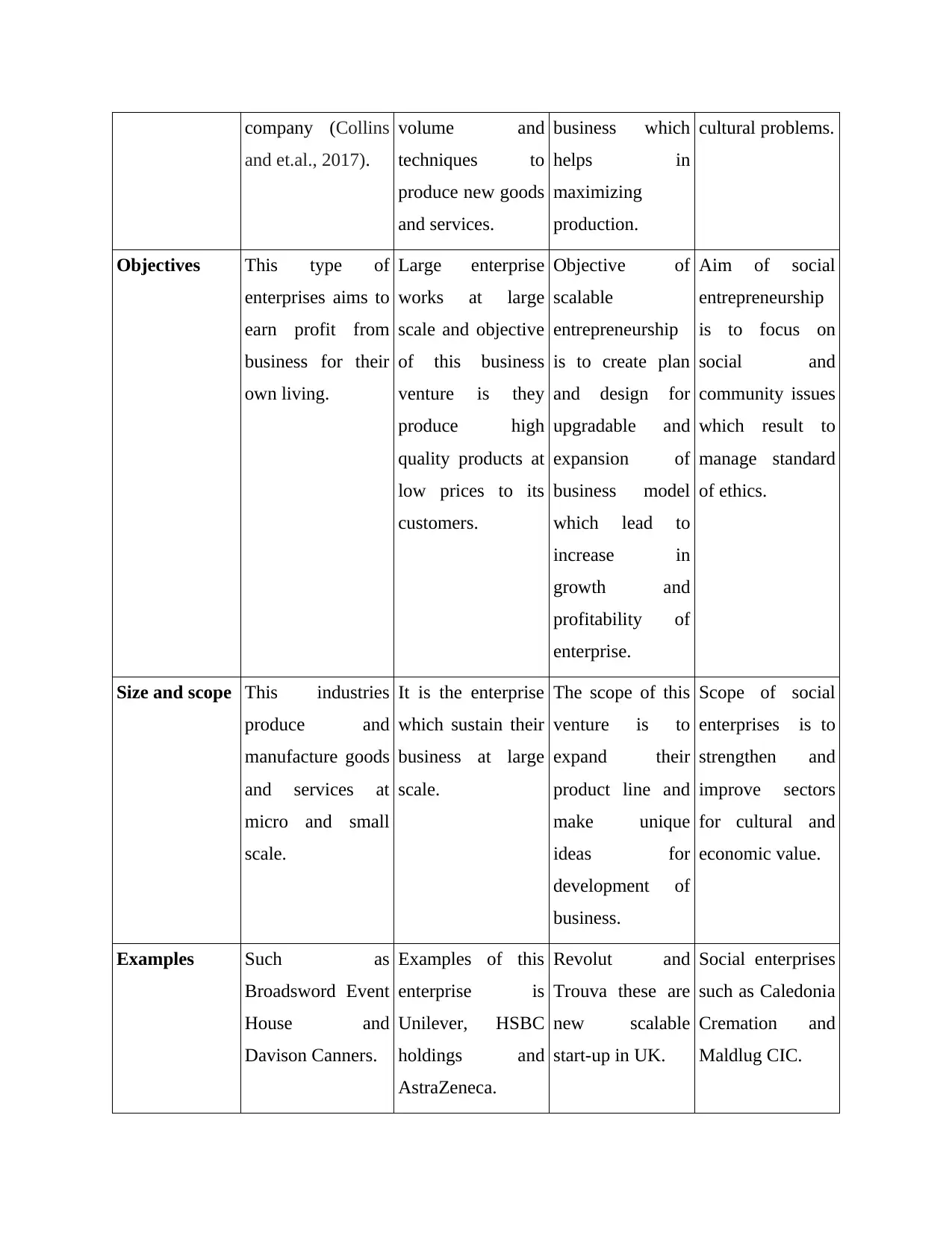
company (Collins
and et.al., 2017).
volume and
techniques to
produce new goods
and services.
business which
helps in
maximizing
production.
cultural problems.
Objectives This type of
enterprises aims to
earn profit from
business for their
own living.
Large enterprise
works at large
scale and objective
of this business
venture is they
produce high
quality products at
low prices to its
customers.
Objective of
scalable
entrepreneurship
is to create plan
and design for
upgradable and
expansion of
business model
which lead to
increase in
growth and
profitability of
enterprise.
Aim of social
entrepreneurship
is to focus on
social and
community issues
which result to
manage standard
of ethics.
Size and scope This industries
produce and
manufacture goods
and services at
micro and small
scale.
It is the enterprise
which sustain their
business at large
scale.
The scope of this
venture is to
expand their
product line and
make unique
ideas for
development of
business.
Scope of social
enterprises is to
strengthen and
improve sectors
for cultural and
economic value.
Examples Such as
Broadsword Event
House and
Davison Canners.
Examples of this
enterprise is
Unilever, HSBC
holdings and
AstraZeneca.
Revolut and
Trouva these are
new scalable
start-up in UK.
Social enterprises
such as Caledonia
Cremation and
Maldlug CIC.
and et.al., 2017).
volume and
techniques to
produce new goods
and services.
business which
helps in
maximizing
production.
cultural problems.
Objectives This type of
enterprises aims to
earn profit from
business for their
own living.
Large enterprise
works at large
scale and objective
of this business
venture is they
produce high
quality products at
low prices to its
customers.
Objective of
scalable
entrepreneurship
is to create plan
and design for
upgradable and
expansion of
business model
which lead to
increase in
growth and
profitability of
enterprise.
Aim of social
entrepreneurship
is to focus on
social and
community issues
which result to
manage standard
of ethics.
Size and scope This industries
produce and
manufacture goods
and services at
micro and small
scale.
It is the enterprise
which sustain their
business at large
scale.
The scope of this
venture is to
expand their
product line and
make unique
ideas for
development of
business.
Scope of social
enterprises is to
strengthen and
improve sectors
for cultural and
economic value.
Examples Such as
Broadsword Event
House and
Davison Canners.
Examples of this
enterprise is
Unilever, HSBC
holdings and
AstraZeneca.
Revolut and
Trouva these are
new scalable
start-up in UK.
Social enterprises
such as Caledonia
Cremation and
Maldlug CIC.
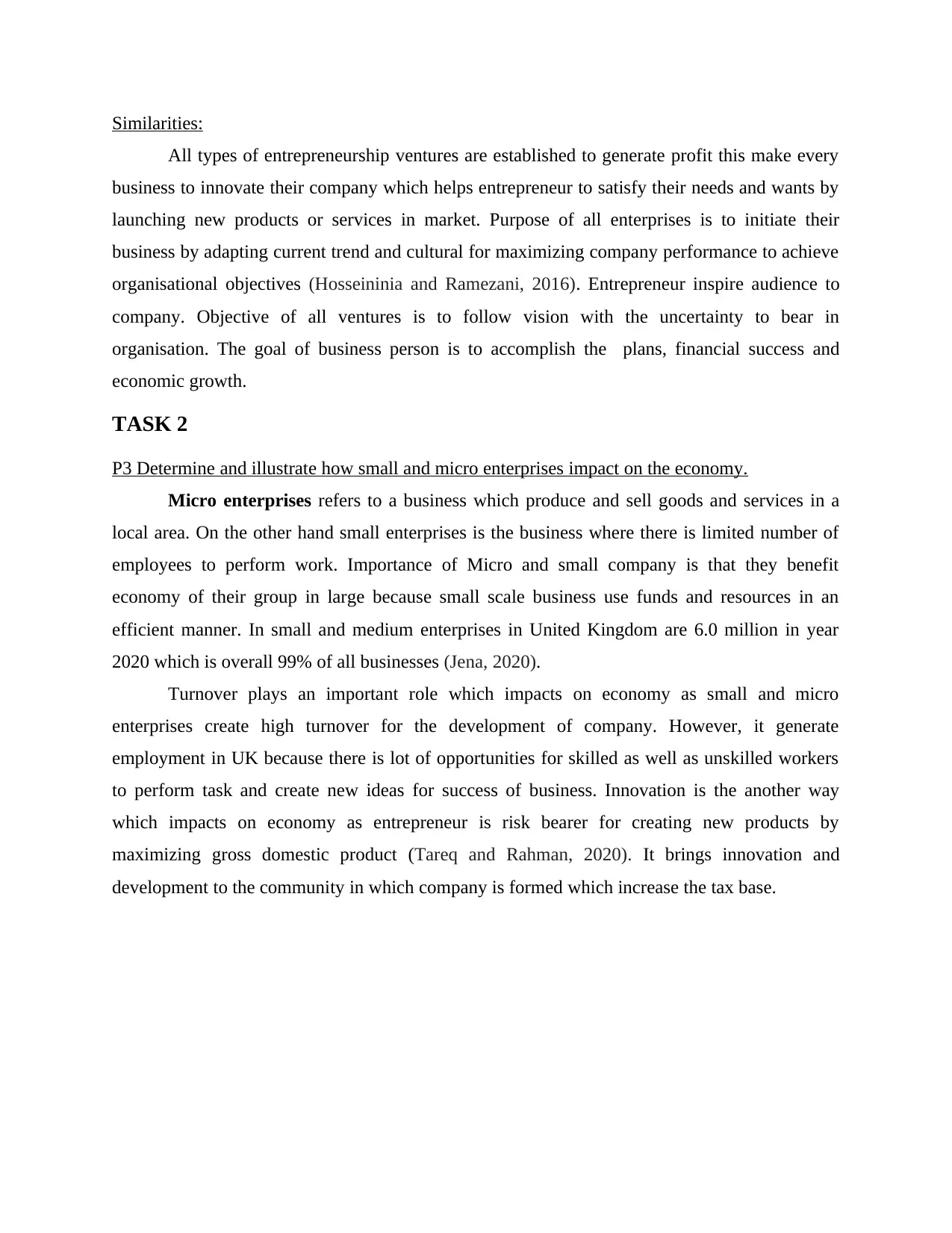
Similarities:
All types of entrepreneurship ventures are established to generate profit this make every
business to innovate their company which helps entrepreneur to satisfy their needs and wants by
launching new products or services in market. Purpose of all enterprises is to initiate their
business by adapting current trend and cultural for maximizing company performance to achieve
organisational objectives (Hosseininia and Ramezani, 2016). Entrepreneur inspire audience to
company. Objective of all ventures is to follow vision with the uncertainty to bear in
organisation. The goal of business person is to accomplish the plans, financial success and
economic growth.
TASK 2
P3 Determine and illustrate how small and micro enterprises impact on the economy.
Micro enterprises refers to a business which produce and sell goods and services in a
local area. On the other hand small enterprises is the business where there is limited number of
employees to perform work. Importance of Micro and small company is that they benefit
economy of their group in large because small scale business use funds and resources in an
efficient manner. In small and medium enterprises in United Kingdom are 6.0 million in year
2020 which is overall 99% of all businesses (Jena, 2020).
Turnover plays an important role which impacts on economy as small and micro
enterprises create high turnover for the development of company. However, it generate
employment in UK because there is lot of opportunities for skilled as well as unskilled workers
to perform task and create new ideas for success of business. Innovation is the another way
which impacts on economy as entrepreneur is risk bearer for creating new products by
maximizing gross domestic product (Tareq and Rahman, 2020). It brings innovation and
development to the community in which company is formed which increase the tax base.
All types of entrepreneurship ventures are established to generate profit this make every
business to innovate their company which helps entrepreneur to satisfy their needs and wants by
launching new products or services in market. Purpose of all enterprises is to initiate their
business by adapting current trend and cultural for maximizing company performance to achieve
organisational objectives (Hosseininia and Ramezani, 2016). Entrepreneur inspire audience to
company. Objective of all ventures is to follow vision with the uncertainty to bear in
organisation. The goal of business person is to accomplish the plans, financial success and
economic growth.
TASK 2
P3 Determine and illustrate how small and micro enterprises impact on the economy.
Micro enterprises refers to a business which produce and sell goods and services in a
local area. On the other hand small enterprises is the business where there is limited number of
employees to perform work. Importance of Micro and small company is that they benefit
economy of their group in large because small scale business use funds and resources in an
efficient manner. In small and medium enterprises in United Kingdom are 6.0 million in year
2020 which is overall 99% of all businesses (Jena, 2020).
Turnover plays an important role which impacts on economy as small and micro
enterprises create high turnover for the development of company. However, it generate
employment in UK because there is lot of opportunities for skilled as well as unskilled workers
to perform task and create new ideas for success of business. Innovation is the another way
which impacts on economy as entrepreneur is risk bearer for creating new products by
maximizing gross domestic product (Tareq and Rahman, 2020). It brings innovation and
development to the community in which company is formed which increase the tax base.
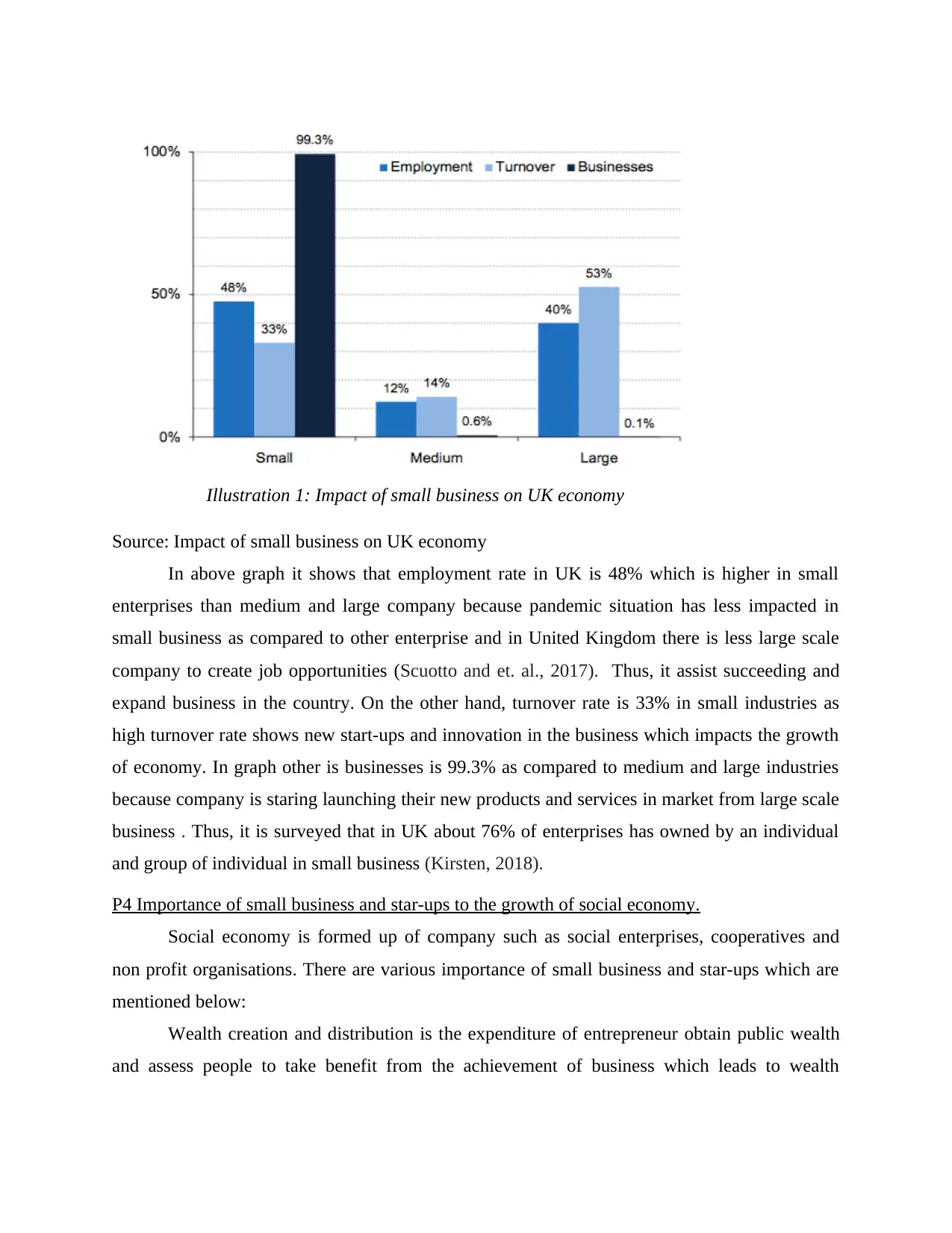
Illustration 1: Impact of small business on UK economy
Source: Impact of small business on UK economy
In above graph it shows that employment rate in UK is 48% which is higher in small
enterprises than medium and large company because pandemic situation has less impacted in
small business as compared to other enterprise and in United Kingdom there is less large scale
company to create job opportunities (Scuotto and et. al., 2017). Thus, it assist succeeding and
expand business in the country. On the other hand, turnover rate is 33% in small industries as
high turnover rate shows new start-ups and innovation in the business which impacts the growth
of economy. In graph other is businesses is 99.3% as compared to medium and large industries
because company is staring launching their new products and services in market from large scale
business . Thus, it is surveyed that in UK about 76% of enterprises has owned by an individual
and group of individual in small business (Kirsten, 2018).
P4 Importance of small business and star-ups to the growth of social economy.
Social economy is formed up of company such as social enterprises, cooperatives and
non profit organisations. There are various importance of small business and star-ups which are
mentioned below:
Wealth creation and distribution is the expenditure of entrepreneur obtain public wealth
and assess people to take benefit from the achievement of business which leads to wealth
Source: Impact of small business on UK economy
In above graph it shows that employment rate in UK is 48% which is higher in small
enterprises than medium and large company because pandemic situation has less impacted in
small business as compared to other enterprise and in United Kingdom there is less large scale
company to create job opportunities (Scuotto and et. al., 2017). Thus, it assist succeeding and
expand business in the country. On the other hand, turnover rate is 33% in small industries as
high turnover rate shows new start-ups and innovation in the business which impacts the growth
of economy. In graph other is businesses is 99.3% as compared to medium and large industries
because company is staring launching their new products and services in market from large scale
business . Thus, it is surveyed that in UK about 76% of enterprises has owned by an individual
and group of individual in small business (Kirsten, 2018).
P4 Importance of small business and star-ups to the growth of social economy.
Social economy is formed up of company such as social enterprises, cooperatives and
non profit organisations. There are various importance of small business and star-ups which are
mentioned below:
Wealth creation and distribution is the expenditure of entrepreneur obtain public wealth
and assess people to take benefit from the achievement of business which leads to wealth
Paraphrase This Document
Need a fresh take? Get an instant paraphrase of this document with our AI Paraphraser
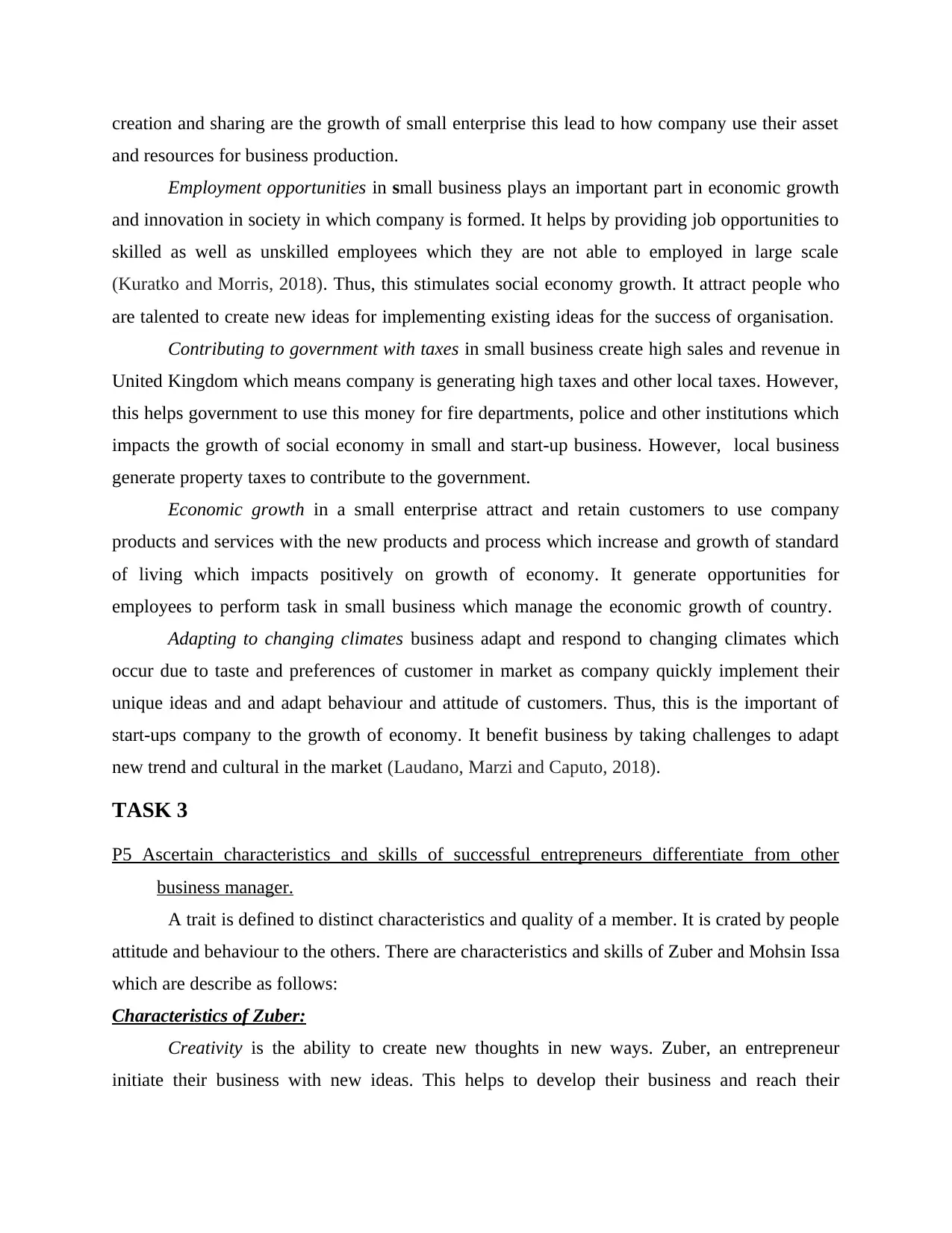
creation and sharing are the growth of small enterprise this lead to how company use their asset
and resources for business production.
Employment opportunities in small business plays an important part in economic growth
and innovation in society in which company is formed. It helps by providing job opportunities to
skilled as well as unskilled employees which they are not able to employed in large scale
(Kuratko and Morris, 2018). Thus, this stimulates social economy growth. It attract people who
are talented to create new ideas for implementing existing ideas for the success of organisation.
Contributing to government with taxes in small business create high sales and revenue in
United Kingdom which means company is generating high taxes and other local taxes. However,
this helps government to use this money for fire departments, police and other institutions which
impacts the growth of social economy in small and start-up business. However, local business
generate property taxes to contribute to the government.
Economic growth in a small enterprise attract and retain customers to use company
products and services with the new products and process which increase and growth of standard
of living which impacts positively on growth of economy. It generate opportunities for
employees to perform task in small business which manage the economic growth of country.
Adapting to changing climates business adapt and respond to changing climates which
occur due to taste and preferences of customer in market as company quickly implement their
unique ideas and and adapt behaviour and attitude of customers. Thus, this is the important of
start-ups company to the growth of economy. It benefit business by taking challenges to adapt
new trend and cultural in the market (Laudano, Marzi and Caputo, 2018).
TASK 3
P5 Ascertain characteristics and skills of successful entrepreneurs differentiate from other
business manager.
A trait is defined to distinct characteristics and quality of a member. It is crated by people
attitude and behaviour to the others. There are characteristics and skills of Zuber and Mohsin Issa
which are describe as follows:
Characteristics of Zuber:
Creativity is the ability to create new thoughts in new ways. Zuber, an entrepreneur
initiate their business with new ideas. This helps to develop their business and reach their
and resources for business production.
Employment opportunities in small business plays an important part in economic growth
and innovation in society in which company is formed. It helps by providing job opportunities to
skilled as well as unskilled employees which they are not able to employed in large scale
(Kuratko and Morris, 2018). Thus, this stimulates social economy growth. It attract people who
are talented to create new ideas for implementing existing ideas for the success of organisation.
Contributing to government with taxes in small business create high sales and revenue in
United Kingdom which means company is generating high taxes and other local taxes. However,
this helps government to use this money for fire departments, police and other institutions which
impacts the growth of social economy in small and start-up business. However, local business
generate property taxes to contribute to the government.
Economic growth in a small enterprise attract and retain customers to use company
products and services with the new products and process which increase and growth of standard
of living which impacts positively on growth of economy. It generate opportunities for
employees to perform task in small business which manage the economic growth of country.
Adapting to changing climates business adapt and respond to changing climates which
occur due to taste and preferences of customer in market as company quickly implement their
unique ideas and and adapt behaviour and attitude of customers. Thus, this is the important of
start-ups company to the growth of economy. It benefit business by taking challenges to adapt
new trend and cultural in the market (Laudano, Marzi and Caputo, 2018).
TASK 3
P5 Ascertain characteristics and skills of successful entrepreneurs differentiate from other
business manager.
A trait is defined to distinct characteristics and quality of a member. It is crated by people
attitude and behaviour to the others. There are characteristics and skills of Zuber and Mohsin Issa
which are describe as follows:
Characteristics of Zuber:
Creativity is the ability to create new thoughts in new ways. Zuber, an entrepreneur
initiate their business with new ideas. This helps to develop their business and reach their
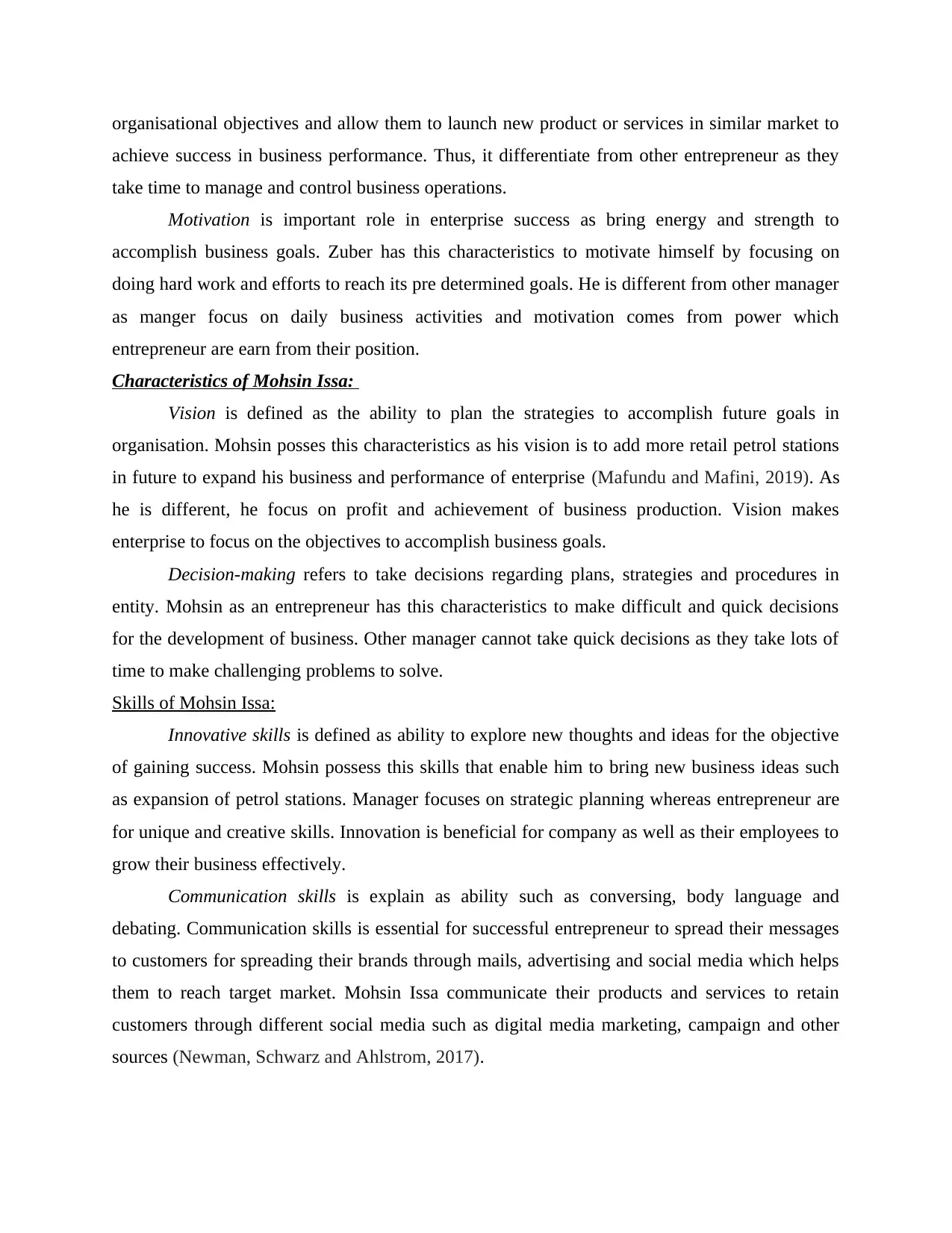
organisational objectives and allow them to launch new product or services in similar market to
achieve success in business performance. Thus, it differentiate from other entrepreneur as they
take time to manage and control business operations.
Motivation is important role in enterprise success as bring energy and strength to
accomplish business goals. Zuber has this characteristics to motivate himself by focusing on
doing hard work and efforts to reach its pre determined goals. He is different from other manager
as manger focus on daily business activities and motivation comes from power which
entrepreneur are earn from their position.
Characteristics of Mohsin Issa:
Vision is defined as the ability to plan the strategies to accomplish future goals in
organisation. Mohsin posses this characteristics as his vision is to add more retail petrol stations
in future to expand his business and performance of enterprise (Mafundu and Mafini, 2019). As
he is different, he focus on profit and achievement of business production. Vision makes
enterprise to focus on the objectives to accomplish business goals.
Decision-making refers to take decisions regarding plans, strategies and procedures in
entity. Mohsin as an entrepreneur has this characteristics to make difficult and quick decisions
for the development of business. Other manager cannot take quick decisions as they take lots of
time to make challenging problems to solve.
Skills of Mohsin Issa:
Innovative skills is defined as ability to explore new thoughts and ideas for the objective
of gaining success. Mohsin possess this skills that enable him to bring new business ideas such
as expansion of petrol stations. Manager focuses on strategic planning whereas entrepreneur are
for unique and creative skills. Innovation is beneficial for company as well as their employees to
grow their business effectively.
Communication skills is explain as ability such as conversing, body language and
debating. Communication skills is essential for successful entrepreneur to spread their messages
to customers for spreading their brands through mails, advertising and social media which helps
them to reach target market. Mohsin Issa communicate their products and services to retain
customers through different social media such as digital media marketing, campaign and other
sources (Newman, Schwarz and Ahlstrom, 2017).
achieve success in business performance. Thus, it differentiate from other entrepreneur as they
take time to manage and control business operations.
Motivation is important role in enterprise success as bring energy and strength to
accomplish business goals. Zuber has this characteristics to motivate himself by focusing on
doing hard work and efforts to reach its pre determined goals. He is different from other manager
as manger focus on daily business activities and motivation comes from power which
entrepreneur are earn from their position.
Characteristics of Mohsin Issa:
Vision is defined as the ability to plan the strategies to accomplish future goals in
organisation. Mohsin posses this characteristics as his vision is to add more retail petrol stations
in future to expand his business and performance of enterprise (Mafundu and Mafini, 2019). As
he is different, he focus on profit and achievement of business production. Vision makes
enterprise to focus on the objectives to accomplish business goals.
Decision-making refers to take decisions regarding plans, strategies and procedures in
entity. Mohsin as an entrepreneur has this characteristics to make difficult and quick decisions
for the development of business. Other manager cannot take quick decisions as they take lots of
time to make challenging problems to solve.
Skills of Mohsin Issa:
Innovative skills is defined as ability to explore new thoughts and ideas for the objective
of gaining success. Mohsin possess this skills that enable him to bring new business ideas such
as expansion of petrol stations. Manager focuses on strategic planning whereas entrepreneur are
for unique and creative skills. Innovation is beneficial for company as well as their employees to
grow their business effectively.
Communication skills is explain as ability such as conversing, body language and
debating. Communication skills is essential for successful entrepreneur to spread their messages
to customers for spreading their brands through mails, advertising and social media which helps
them to reach target market. Mohsin Issa communicate their products and services to retain
customers through different social media such as digital media marketing, campaign and other
sources (Newman, Schwarz and Ahlstrom, 2017).
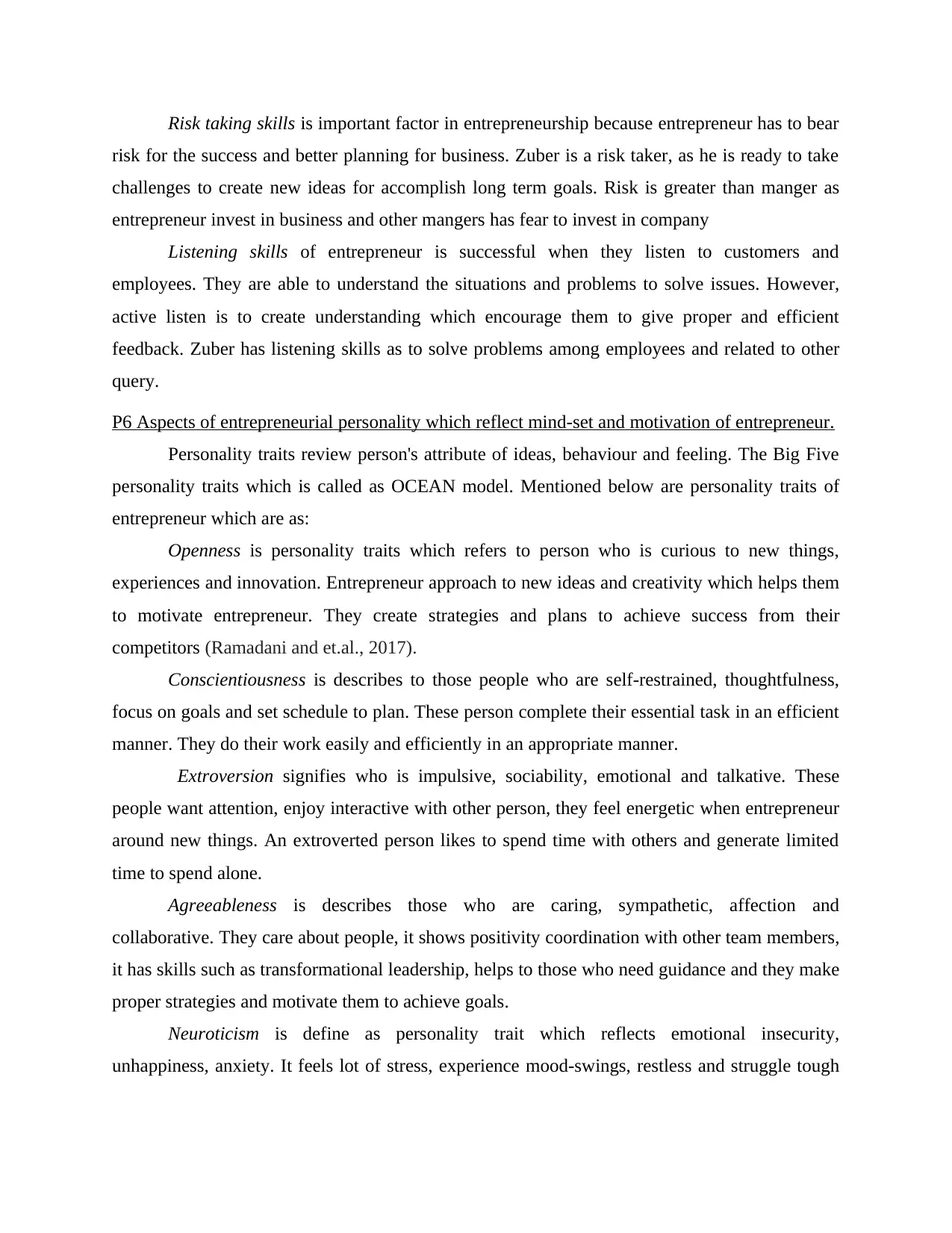
Risk taking skills is important factor in entrepreneurship because entrepreneur has to bear
risk for the success and better planning for business. Zuber is a risk taker, as he is ready to take
challenges to create new ideas for accomplish long term goals. Risk is greater than manger as
entrepreneur invest in business and other mangers has fear to invest in company
Listening skills of entrepreneur is successful when they listen to customers and
employees. They are able to understand the situations and problems to solve issues. However,
active listen is to create understanding which encourage them to give proper and efficient
feedback. Zuber has listening skills as to solve problems among employees and related to other
query.
P6 Aspects of entrepreneurial personality which reflect mind-set and motivation of entrepreneur.
Personality traits review person's attribute of ideas, behaviour and feeling. The Big Five
personality traits which is called as OCEAN model. Mentioned below are personality traits of
entrepreneur which are as:
Openness is personality traits which refers to person who is curious to new things,
experiences and innovation. Entrepreneur approach to new ideas and creativity which helps them
to motivate entrepreneur. They create strategies and plans to achieve success from their
competitors (Ramadani and et.al., 2017).
Conscientiousness is describes to those people who are self-restrained, thoughtfulness,
focus on goals and set schedule to plan. These person complete their essential task in an efficient
manner. They do their work easily and efficiently in an appropriate manner.
Extroversion signifies who is impulsive, sociability, emotional and talkative. These
people want attention, enjoy interactive with other person, they feel energetic when entrepreneur
around new things. An extroverted person likes to spend time with others and generate limited
time to spend alone.
Agreeableness is describes those who are caring, sympathetic, affection and
collaborative. They care about people, it shows positivity coordination with other team members,
it has skills such as transformational leadership, helps to those who need guidance and they make
proper strategies and motivate them to achieve goals.
Neuroticism is define as personality trait which reflects emotional insecurity,
unhappiness, anxiety. It feels lot of stress, experience mood-swings, restless and struggle tough
risk for the success and better planning for business. Zuber is a risk taker, as he is ready to take
challenges to create new ideas for accomplish long term goals. Risk is greater than manger as
entrepreneur invest in business and other mangers has fear to invest in company
Listening skills of entrepreneur is successful when they listen to customers and
employees. They are able to understand the situations and problems to solve issues. However,
active listen is to create understanding which encourage them to give proper and efficient
feedback. Zuber has listening skills as to solve problems among employees and related to other
query.
P6 Aspects of entrepreneurial personality which reflect mind-set and motivation of entrepreneur.
Personality traits review person's attribute of ideas, behaviour and feeling. The Big Five
personality traits which is called as OCEAN model. Mentioned below are personality traits of
entrepreneur which are as:
Openness is personality traits which refers to person who is curious to new things,
experiences and innovation. Entrepreneur approach to new ideas and creativity which helps them
to motivate entrepreneur. They create strategies and plans to achieve success from their
competitors (Ramadani and et.al., 2017).
Conscientiousness is describes to those people who are self-restrained, thoughtfulness,
focus on goals and set schedule to plan. These person complete their essential task in an efficient
manner. They do their work easily and efficiently in an appropriate manner.
Extroversion signifies who is impulsive, sociability, emotional and talkative. These
people want attention, enjoy interactive with other person, they feel energetic when entrepreneur
around new things. An extroverted person likes to spend time with others and generate limited
time to spend alone.
Agreeableness is describes those who are caring, sympathetic, affection and
collaborative. They care about people, it shows positivity coordination with other team members,
it has skills such as transformational leadership, helps to those who need guidance and they make
proper strategies and motivate them to achieve goals.
Neuroticism is define as personality trait which reflects emotional insecurity,
unhappiness, anxiety. It feels lot of stress, experience mood-swings, restless and struggle tough
Secure Best Marks with AI Grader
Need help grading? Try our AI Grader for instant feedback on your assignments.
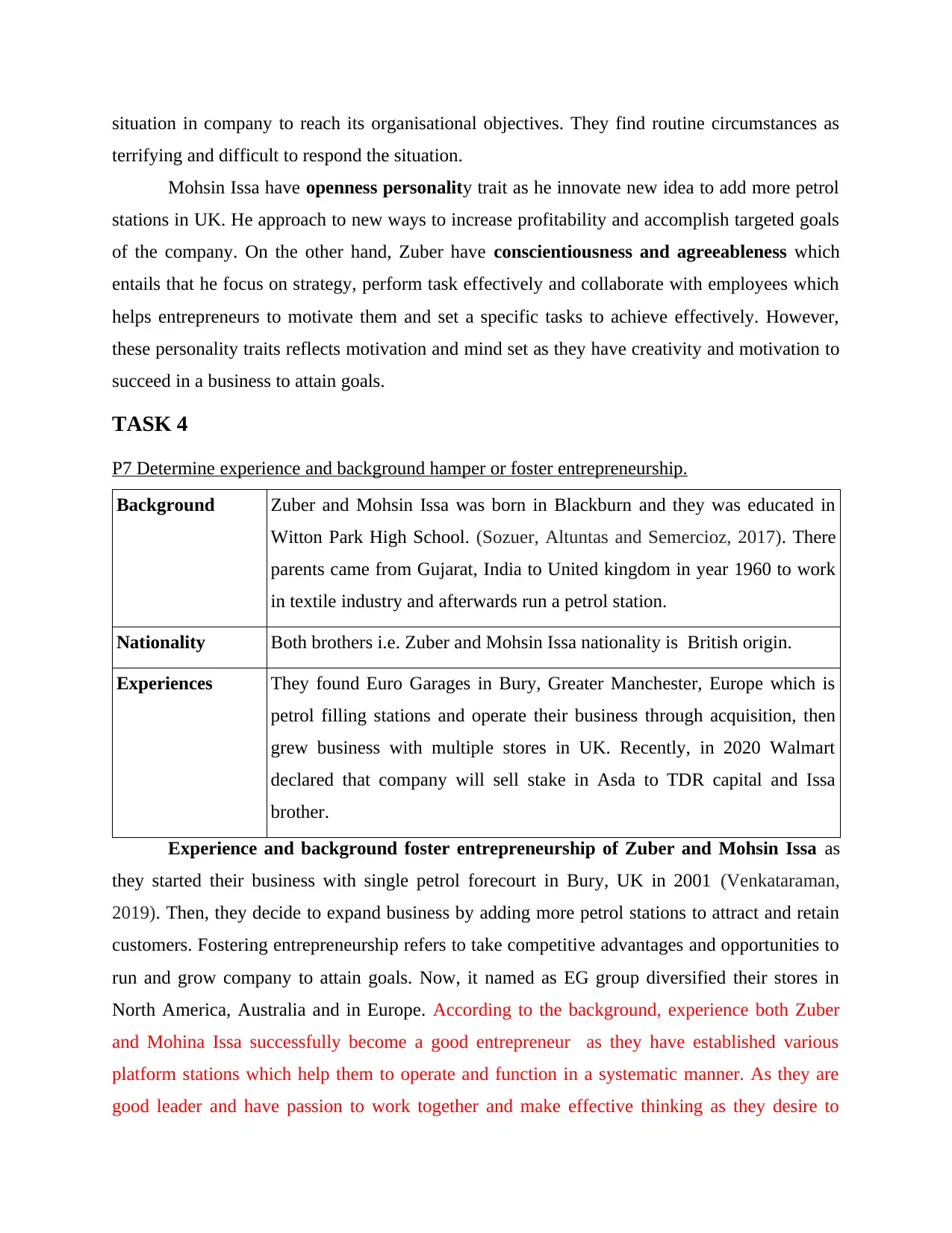
situation in company to reach its organisational objectives. They find routine circumstances as
terrifying and difficult to respond the situation.
Mohsin Issa have openness personality trait as he innovate new idea to add more petrol
stations in UK. He approach to new ways to increase profitability and accomplish targeted goals
of the company. On the other hand, Zuber have conscientiousness and agreeableness which
entails that he focus on strategy, perform task effectively and collaborate with employees which
helps entrepreneurs to motivate them and set a specific tasks to achieve effectively. However,
these personality traits reflects motivation and mind set as they have creativity and motivation to
succeed in a business to attain goals.
TASK 4
P7 Determine experience and background hamper or foster entrepreneurship.
Background Zuber and Mohsin Issa was born in Blackburn and they was educated in
Witton Park High School. (Sozuer, Altuntas and Semercioz, 2017). There
parents came from Gujarat, India to United kingdom in year 1960 to work
in textile industry and afterwards run a petrol station.
Nationality Both brothers i.e. Zuber and Mohsin Issa nationality is British origin.
Experiences They found Euro Garages in Bury, Greater Manchester, Europe which is
petrol filling stations and operate their business through acquisition, then
grew business with multiple stores in UK. Recently, in 2020 Walmart
declared that company will sell stake in Asda to TDR capital and Issa
brother.
Experience and background foster entrepreneurship of Zuber and Mohsin Issa as
they started their business with single petrol forecourt in Bury, UK in 2001 (Venkataraman,
2019). Then, they decide to expand business by adding more petrol stations to attract and retain
customers. Fostering entrepreneurship refers to take competitive advantages and opportunities to
run and grow company to attain goals. Now, it named as EG group diversified their stores in
North America, Australia and in Europe. According to the background, experience both Zuber
and Mohina Issa successfully become a good entrepreneur as they have established various
platform stations which help them to operate and function in a systematic manner. As they are
good leader and have passion to work together and make effective thinking as they desire to
terrifying and difficult to respond the situation.
Mohsin Issa have openness personality trait as he innovate new idea to add more petrol
stations in UK. He approach to new ways to increase profitability and accomplish targeted goals
of the company. On the other hand, Zuber have conscientiousness and agreeableness which
entails that he focus on strategy, perform task effectively and collaborate with employees which
helps entrepreneurs to motivate them and set a specific tasks to achieve effectively. However,
these personality traits reflects motivation and mind set as they have creativity and motivation to
succeed in a business to attain goals.
TASK 4
P7 Determine experience and background hamper or foster entrepreneurship.
Background Zuber and Mohsin Issa was born in Blackburn and they was educated in
Witton Park High School. (Sozuer, Altuntas and Semercioz, 2017). There
parents came from Gujarat, India to United kingdom in year 1960 to work
in textile industry and afterwards run a petrol station.
Nationality Both brothers i.e. Zuber and Mohsin Issa nationality is British origin.
Experiences They found Euro Garages in Bury, Greater Manchester, Europe which is
petrol filling stations and operate their business through acquisition, then
grew business with multiple stores in UK. Recently, in 2020 Walmart
declared that company will sell stake in Asda to TDR capital and Issa
brother.
Experience and background foster entrepreneurship of Zuber and Mohsin Issa as
they started their business with single petrol forecourt in Bury, UK in 2001 (Venkataraman,
2019). Then, they decide to expand business by adding more petrol stations to attract and retain
customers. Fostering entrepreneurship refers to take competitive advantages and opportunities to
run and grow company to attain goals. Now, it named as EG group diversified their stores in
North America, Australia and in Europe. According to the background, experience both Zuber
and Mohina Issa successfully become a good entrepreneur as they have established various
platform stations which help them to operate and function in a systematic manner. As they are
good leader and have passion to work together and make effective thinking as they desire to
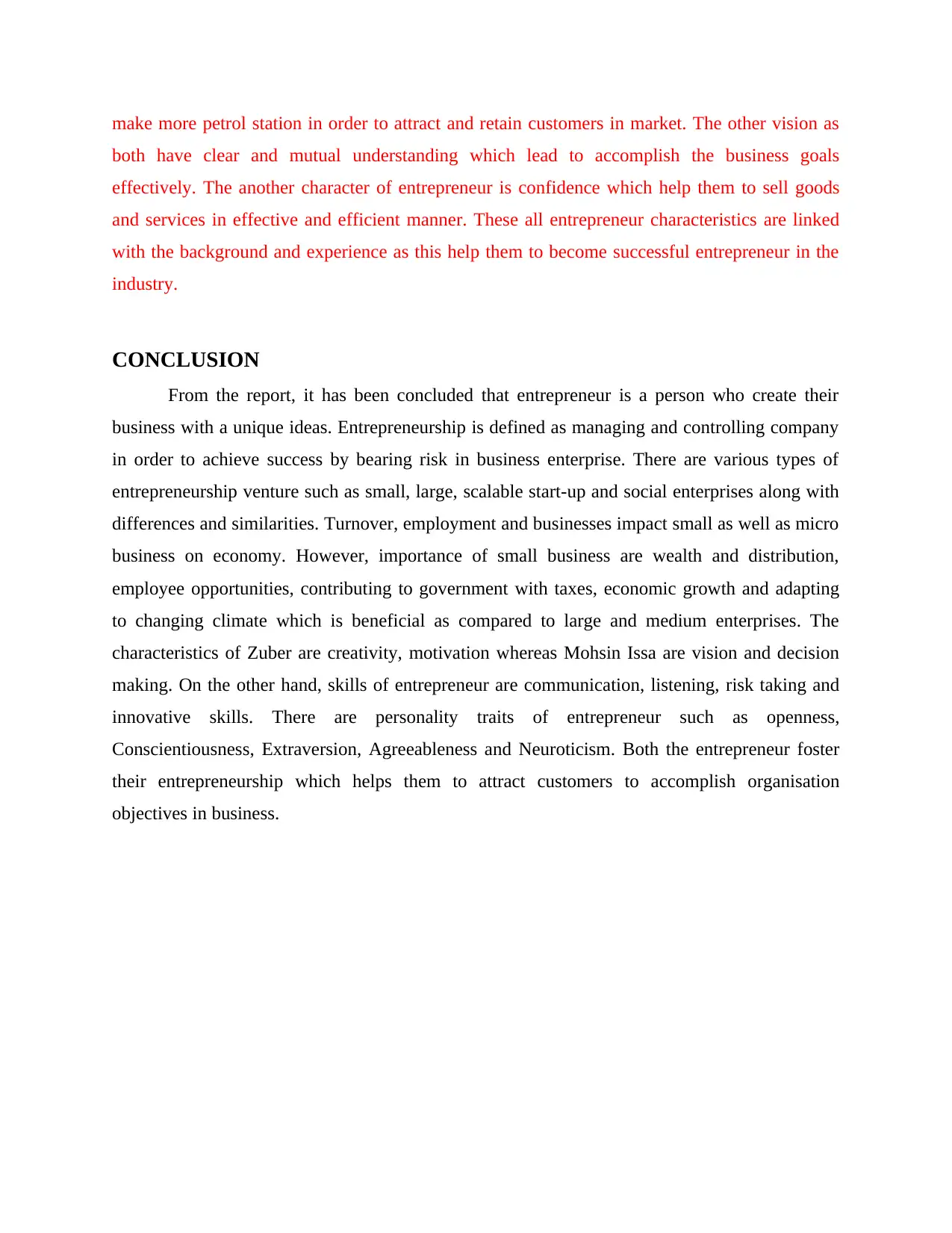
make more petrol station in order to attract and retain customers in market. The other vision as
both have clear and mutual understanding which lead to accomplish the business goals
effectively. The another character of entrepreneur is confidence which help them to sell goods
and services in effective and efficient manner. These all entrepreneur characteristics are linked
with the background and experience as this help them to become successful entrepreneur in the
industry.
CONCLUSION
From the report, it has been concluded that entrepreneur is a person who create their
business with a unique ideas. Entrepreneurship is defined as managing and controlling company
in order to achieve success by bearing risk in business enterprise. There are various types of
entrepreneurship venture such as small, large, scalable start-up and social enterprises along with
differences and similarities. Turnover, employment and businesses impact small as well as micro
business on economy. However, importance of small business are wealth and distribution,
employee opportunities, contributing to government with taxes, economic growth and adapting
to changing climate which is beneficial as compared to large and medium enterprises. The
characteristics of Zuber are creativity, motivation whereas Mohsin Issa are vision and decision
making. On the other hand, skills of entrepreneur are communication, listening, risk taking and
innovative skills. There are personality traits of entrepreneur such as openness,
Conscientiousness, Extraversion, Agreeableness and Neuroticism. Both the entrepreneur foster
their entrepreneurship which helps them to attract customers to accomplish organisation
objectives in business.
both have clear and mutual understanding which lead to accomplish the business goals
effectively. The another character of entrepreneur is confidence which help them to sell goods
and services in effective and efficient manner. These all entrepreneur characteristics are linked
with the background and experience as this help them to become successful entrepreneur in the
industry.
CONCLUSION
From the report, it has been concluded that entrepreneur is a person who create their
business with a unique ideas. Entrepreneurship is defined as managing and controlling company
in order to achieve success by bearing risk in business enterprise. There are various types of
entrepreneurship venture such as small, large, scalable start-up and social enterprises along with
differences and similarities. Turnover, employment and businesses impact small as well as micro
business on economy. However, importance of small business are wealth and distribution,
employee opportunities, contributing to government with taxes, economic growth and adapting
to changing climate which is beneficial as compared to large and medium enterprises. The
characteristics of Zuber are creativity, motivation whereas Mohsin Issa are vision and decision
making. On the other hand, skills of entrepreneur are communication, listening, risk taking and
innovative skills. There are personality traits of entrepreneur such as openness,
Conscientiousness, Extraversion, Agreeableness and Neuroticism. Both the entrepreneur foster
their entrepreneurship which helps them to attract customers to accomplish organisation
objectives in business.
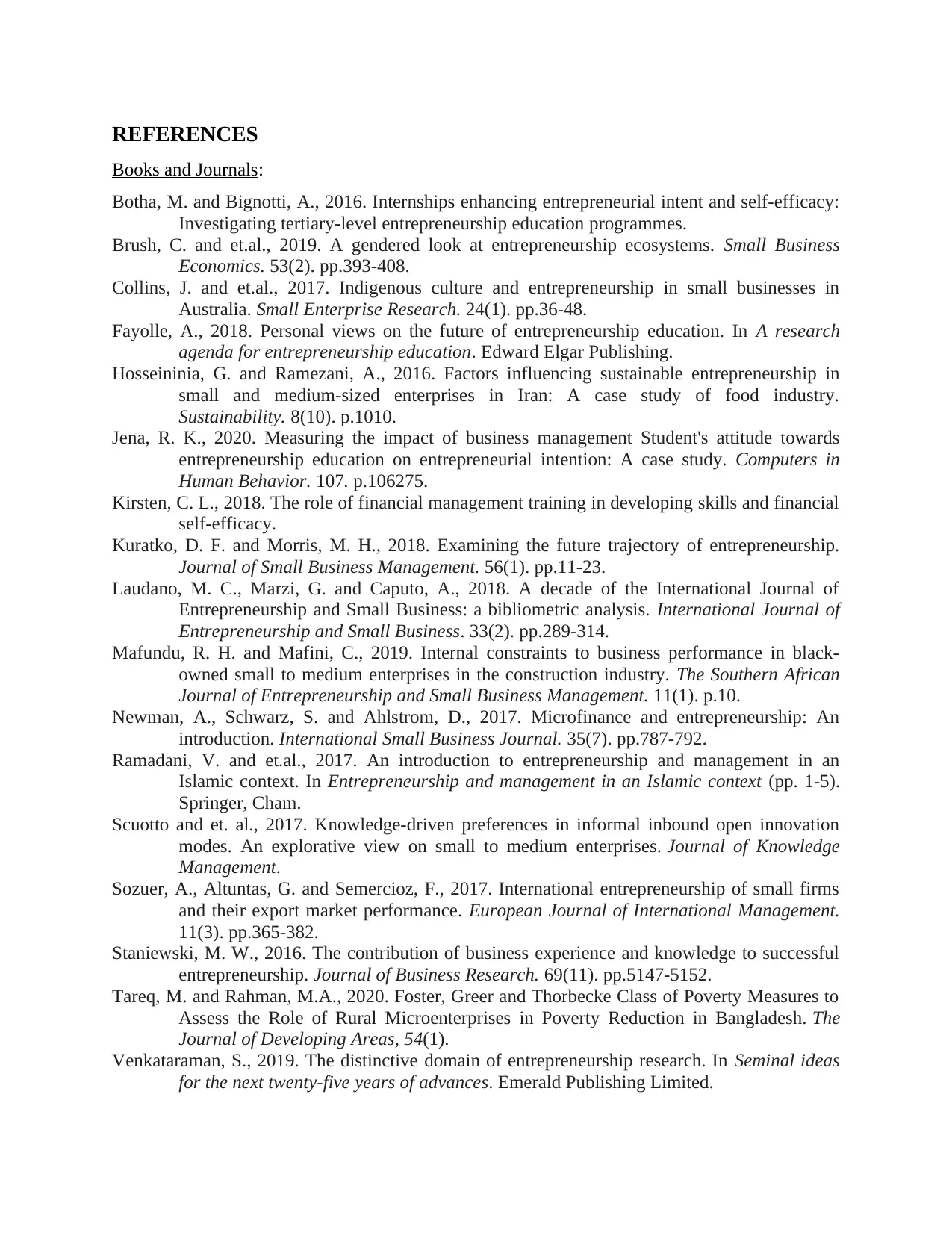
REFERENCES
Books and Journals:
Botha, M. and Bignotti, A., 2016. Internships enhancing entrepreneurial intent and self-efficacy:
Investigating tertiary-level entrepreneurship education programmes.
Brush, C. and et.al., 2019. A gendered look at entrepreneurship ecosystems. Small Business
Economics. 53(2). pp.393-408.
Collins, J. and et.al., 2017. Indigenous culture and entrepreneurship in small businesses in
Australia. Small Enterprise Research. 24(1). pp.36-48.
Fayolle, A., 2018. Personal views on the future of entrepreneurship education. In A research
agenda for entrepreneurship education. Edward Elgar Publishing.
Hosseininia, G. and Ramezani, A., 2016. Factors influencing sustainable entrepreneurship in
small and medium-sized enterprises in Iran: A case study of food industry.
Sustainability. 8(10). p.1010.
Jena, R. K., 2020. Measuring the impact of business management Student's attitude towards
entrepreneurship education on entrepreneurial intention: A case study. Computers in
Human Behavior. 107. p.106275.
Kirsten, C. L., 2018. The role of financial management training in developing skills and financial
self-efficacy.
Kuratko, D. F. and Morris, M. H., 2018. Examining the future trajectory of entrepreneurship.
Journal of Small Business Management. 56(1). pp.11-23.
Laudano, M. C., Marzi, G. and Caputo, A., 2018. A decade of the International Journal of
Entrepreneurship and Small Business: a bibliometric analysis. International Journal of
Entrepreneurship and Small Business. 33(2). pp.289-314.
Mafundu, R. H. and Mafini, C., 2019. Internal constraints to business performance in black-
owned small to medium enterprises in the construction industry. The Southern African
Journal of Entrepreneurship and Small Business Management. 11(1). p.10.
Newman, A., Schwarz, S. and Ahlstrom, D., 2017. Microfinance and entrepreneurship: An
introduction. International Small Business Journal. 35(7). pp.787-792.
Ramadani, V. and et.al., 2017. An introduction to entrepreneurship and management in an
Islamic context. In Entrepreneurship and management in an Islamic context (pp. 1-5).
Springer, Cham.
Scuotto and et. al., 2017. Knowledge-driven preferences in informal inbound open innovation
modes. An explorative view on small to medium enterprises. Journal of Knowledge
Management.
Sozuer, A., Altuntas, G. and Semercioz, F., 2017. International entrepreneurship of small firms
and their export market performance. European Journal of International Management.
11(3). pp.365-382.
Staniewski, M. W., 2016. The contribution of business experience and knowledge to successful
entrepreneurship. Journal of Business Research. 69(11). pp.5147-5152.
Tareq, M. and Rahman, M.A., 2020. Foster, Greer and Thorbecke Class of Poverty Measures to
Assess the Role of Rural Microenterprises in Poverty Reduction in Bangladesh. The
Journal of Developing Areas, 54(1).
Venkataraman, S., 2019. The distinctive domain of entrepreneurship research. In Seminal ideas
for the next twenty-five years of advances. Emerald Publishing Limited.
Books and Journals:
Botha, M. and Bignotti, A., 2016. Internships enhancing entrepreneurial intent and self-efficacy:
Investigating tertiary-level entrepreneurship education programmes.
Brush, C. and et.al., 2019. A gendered look at entrepreneurship ecosystems. Small Business
Economics. 53(2). pp.393-408.
Collins, J. and et.al., 2017. Indigenous culture and entrepreneurship in small businesses in
Australia. Small Enterprise Research. 24(1). pp.36-48.
Fayolle, A., 2018. Personal views on the future of entrepreneurship education. In A research
agenda for entrepreneurship education. Edward Elgar Publishing.
Hosseininia, G. and Ramezani, A., 2016. Factors influencing sustainable entrepreneurship in
small and medium-sized enterprises in Iran: A case study of food industry.
Sustainability. 8(10). p.1010.
Jena, R. K., 2020. Measuring the impact of business management Student's attitude towards
entrepreneurship education on entrepreneurial intention: A case study. Computers in
Human Behavior. 107. p.106275.
Kirsten, C. L., 2018. The role of financial management training in developing skills and financial
self-efficacy.
Kuratko, D. F. and Morris, M. H., 2018. Examining the future trajectory of entrepreneurship.
Journal of Small Business Management. 56(1). pp.11-23.
Laudano, M. C., Marzi, G. and Caputo, A., 2018. A decade of the International Journal of
Entrepreneurship and Small Business: a bibliometric analysis. International Journal of
Entrepreneurship and Small Business. 33(2). pp.289-314.
Mafundu, R. H. and Mafini, C., 2019. Internal constraints to business performance in black-
owned small to medium enterprises in the construction industry. The Southern African
Journal of Entrepreneurship and Small Business Management. 11(1). p.10.
Newman, A., Schwarz, S. and Ahlstrom, D., 2017. Microfinance and entrepreneurship: An
introduction. International Small Business Journal. 35(7). pp.787-792.
Ramadani, V. and et.al., 2017. An introduction to entrepreneurship and management in an
Islamic context. In Entrepreneurship and management in an Islamic context (pp. 1-5).
Springer, Cham.
Scuotto and et. al., 2017. Knowledge-driven preferences in informal inbound open innovation
modes. An explorative view on small to medium enterprises. Journal of Knowledge
Management.
Sozuer, A., Altuntas, G. and Semercioz, F., 2017. International entrepreneurship of small firms
and their export market performance. European Journal of International Management.
11(3). pp.365-382.
Staniewski, M. W., 2016. The contribution of business experience and knowledge to successful
entrepreneurship. Journal of Business Research. 69(11). pp.5147-5152.
Tareq, M. and Rahman, M.A., 2020. Foster, Greer and Thorbecke Class of Poverty Measures to
Assess the Role of Rural Microenterprises in Poverty Reduction in Bangladesh. The
Journal of Developing Areas, 54(1).
Venkataraman, S., 2019. The distinctive domain of entrepreneurship research. In Seminal ideas
for the next twenty-five years of advances. Emerald Publishing Limited.
1 out of 13
Related Documents
Your All-in-One AI-Powered Toolkit for Academic Success.
+13062052269
info@desklib.com
Available 24*7 on WhatsApp / Email
![[object Object]](/_next/static/media/star-bottom.7253800d.svg)
Unlock your academic potential
© 2024 | Zucol Services PVT LTD | All rights reserved.



